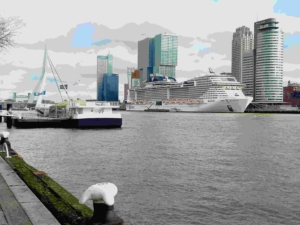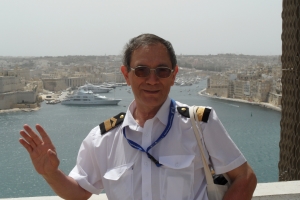Rotterdam’s energy transformation.The city and the port as one organism

 By Marek Grzybowski
By Marek Grzybowski
Rotterdam, a city and port located on the North Sea, uses its location to create maritime, logistic and business connections between Northern Europe and the world. The port and the industrial clusters operating there are a place to create competitive advantage based on innovation.
Port No. 1 in Europe, where over 3,400 companies related to maritime industries operate with a total added value of approximately EUR 5.2 billion – this is the shortest review of the symbiosis and synergy of the port and the city. It is the activity related to industrial access to the sea, and not development activity, that gives Rotterdam an advantage on the world map. The competitiveness of the city and the port is built on the basis of private entrepreneurship, supported by the pro-export strategy of the government and the city.
Today, the leading strategic goal is to transform the port and the city into an ecological area. Rotterdam is still traditionally a port and industrial complex that relies heavily on the use of fossil fuels. And this involves the emission of harmful gases. The industrial complex, built over the years, is already undergoing a transformation for which there is not much time.
Enterprises operating in industrial clusters are an inherent part of the global energy market and contribute to the import, export and production of energy for heavy industry.
Rotterdam clean by 2050
– In line with European and national climate goals, Rotterdam wants to become carbon neutral by 2050. To achieve this, the focus is on carbon capture, use and storage (CCUS), hydrogen, offshore wind, efficient (re)use of energy and raw materials and electricity, reports Rotterdams Klimaatakkoord.
As Rotterdam plans to become a fully green society and a climate-neutral city by 2050, the city authorities have introduced over 50 new measures to reduce greenhouse gases and stimulate a CO2-free economy. It gives priority to projects that reduce energy consumption in households. Rotterdam promotes the greening of districts to alleviate the effects of islands of residential and office buildings that constitute heat sources. The city actively promotes circular economy practices that save valuable resources.
These tasks cannot be accomplished without the cooperation of the port administration and the industrial clusters operating there. It is no secret that these are the main sources requiring large expenditures for energy transformation.
Port, science and administration – strong synergy
This is just one of the projects in Rotterdam that created an efficient group integrating the activities of administration, business, scientific units and social groups.
– Combination of port, energy and petrochemical clusters, specialized studies and courses related to energy transition and sustainable development in renowned institutes such as TU Delft, Erasmus University Rotterdam, Rotterdam UAS, STC Group, Techniek College Rotterdam, related activities of NGOs and research institutes all together creates a unique ecosystem in the field of energy transformation – informs the city administration.
Rotterdam’s energy ecosystem consists of two components, business and administrative. These are the companies and systems that manage the city and region’s energy supply on land, such as power plants, suppliers, network operators and enterprises. These are companies and institutions that design, develop, supply or install sustainable energy sources and energy conservation measures in the built environment.
– When it comes to the energy transition in this built environment, it mainly involves sustainable electricity, natural gas-free heat supplies and new energy systems, says Rotterdam.
The city invests in ecology
The Rotterdam administration is investing heavily in the energy transition, guided by the principle that the energy transition must be accessible to all Rotterdam residents and that energy transition and climate change adaptation measures must stimulate employment in transition sectors.
Dedicated budgets and programs (including the Sustainability Transition Budget, Energy Transition Fund, Energy Transition Loans, Climate Tables) stimulate the innovation necessary for a successful transition.
– The city of Rotterdam has allocated EUR 100 million for sustainable, innovative projects in Rotterdam. The amount of PLN 100 million for sustainable enterprises comes from the Energy Transformation Fund, created to accelerate the local energy transformation and stimulate the economy, reports “Business in Rotterdam”.
These funds can be used to build a factory engaged in innovative recycling or large-scale energy storage. In addition, Rotterdam is making available EUR 30 million from the fund for loans to SMEs. The Energy Transition Fund is a revolving fund, which means that investment proceeds flow back into the fund so that new investments can be made.
Hydrogen in the Delta or how to take care of local content
At the beginning of 2023, the De Nederlandse Waterstof Delta consortium submitted a plan to the Bontenbal (CDA), Boucke (D66) and Erkens (VVD) parliaments to revitalize the electrolyzer industry and thus accelerate the hydrogen economy. The plan – De Nederlandse Waterstof Delta – was developed by 12 consortium partners, and for its implementation an application for funding of approximately EUR 80 million was submitted from the National Development Fund.
The plan ensures that the Netherlands will increase its autonomy and start building its own plants needed to produce green hydrogen. From 2026, De Nederlandse Waterstof Delta will supply 1 gigawatt per year to the power plant. This will enable it to supply half of all the power plants needed by the Netherlands to achieve its transitional climate goals by 2030.
The power plants will operate based on the unique Dutch Battolyser hydrogen battery. This technology, developed at TU Delft, enables the storage of electricity and the production of green hydrogen from renewable energy. The system will produce hydrogen when a large amount of wind and solar power is available, and supply electricity to the grid when there is a shortage of electricity due to weak wind and solar power.
These and other initiatives of the city and port of Rotterdam and the industrial clusters established in the port area and the Nederlandse Waterstof Delta, through the synergy effect, accelerate the energy transformation. And this is the basis for achieving the climate goals set by the port and the city. Because in Rotterdam, the port and the city are one ecosystem.
